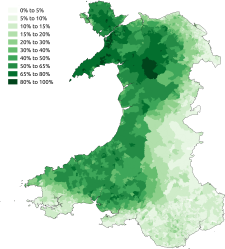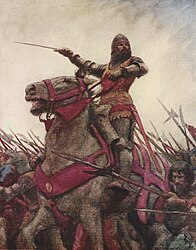Welsh surnames are those held by individuals living in Wales and overseas within the Welsh diaspora. Welsh surnames are the product of two different influences. Many of them are derived from the Welsh language or Cymric which was dominant here during the early medieval period and into the High Middle Ages (c. 1000 – 1300). The second influence is owing to the encroachment of the Anglo-Normans and English into Wales from the twelfth century onwards, leading to the introduction of English surnames and also the Anglicization of many Welsh or Cymric surnames.
History of Welsh surnames and naming conventions
Welsh surnames, in a phenomenon somewhat similar to the development of Scottish surnames, are the product of two different cultural influences. On the one hand, Welsh surnames are derived from the Cymric or Welsh language. This is a Celtic-Brittonic language that developed gradually from Roman times into the early medieval period. It had taken on a coherent form by the eighth and ninth centuries. At this time there were few people possessed of surnames of any kind in Wales, but in the course of the High Middle Ages, Welsh people began using surnames to describe their line of descent from a famous forbear or their place of origin or occupation. Consequently, surnames like Griphiud, a Cymric or Welsh surname meaning ‘strong lord’, began to emerge here.[1]
However, Welsh surname history shifted considerably during the late medieval period. This was owing to English encroachment into the country. The Anglo-Normans under William the Conqueror in the late eleventh century had already begun conquering parts of the Welsh march region in the east of the country. The wider English conquest of Wales took several centuries though, with the process advanced considerably during the reign of King Edward I of England (r. 1272–1307), with the future King Edward II becoming the first English Prince of Wales in 1301.[2]
With the English conquest of Wales, a gradual process of Anglicization began. On the one hand, this resulted in Welsh or Cymric surnames becoming slightly anglicized. So, for instance, Griphiud became Griffith. This tendency became particularly pronounced in the nineteenth century as Victorian educators pressured individuals with Welsh surnames to adopt a more anglicized version of their name. This emphasized, for instance, dropping the ‘ap’ patronymic element from a Welsh surname like ‘ap Hugh’ meaning ‘of Hugh’. Hence we have many Welsh surnames today which are originally Welsh or Cymric in origin, but which have an anglicized element to their spelling and pronunciation. In addition to this, more straight-forward English surnames were also introduced in considerable numbers to Wales as English lords were granted lands here over the centuries. Accordingly, there are a large number of Smiths, Browns and other English surnames in Wales today.[3]
Most popular Welsh surnames and their meanings
The most popular Welsh surnames tend to be as follows:[4]
- Jones – This is the most common surname in Wales. It is an anglicized version of the Welsh surname Ioan or Ieuan, which effectively is a patronymic meaning ‘son of John’. Approximately 170,000 Welsh people carry the Jones surname today.[5]
- Davies – The second most common surname in Wales. There is a debate as to the origins and meaning of this surname. It is now widely understood that it is a corruption of the Cymric surname Dyfed for ‘David’ and thus of Biblical origin.[6]
- Griffiths – Tens of thousands of Welsh people have this surname. It comes from the Old Welsh or Cymric surname Griphiud which transliterates as ‘strong lord’, indicating that people who carried this surname early on were of noble descent.
- Owen – A slightly anglicized version of the Welsh name Owain. It was originally a first name or personal name, however from the late fifteenth century onwards it was gradually adopted as a surname in large part owing to a romantic Welsh nationalism which celebrated the achievements of several medieval Welsh princes such as Owain ap Gruffydd who had resisted English rule in Wales.
Geographical spread of Welsh surnames

Welsh surnames are found throughout Wales, though there tends to be something of a geographical division in terms of where the more anglicized Welsh surnames are found. These are typically in the east and south of the country which are the parts of Wales lying nearest to England and those which historically have been most closely governed by the English since the twelfth and thirteenth centuries.
The west and north, by way of contrast, are regions that were less anglicized in medieval and early modern times. This is owing to the geographical remoteness of the west of Wales from the English march regions and in the case of northern Wales because the land here is mountainous and was less prioritized by English nobles seeking to acquire lands in Wales after the English conquest of the country. As a result, the further north and west one heads in Wales the more like they are to come across people with distinctly Welsh surnames like Griffiths, Davies and Llewellyn.
Famous people with Welsh surnames

- Owain ap Gruffydd – Also known as Owain Glyndŵr, a Welsh prince and political leader who resisted English rule in Wales in the early fifteenth century. His surname is a patronymic effectively meaning ‘Owen, son of Griffith’.[7]
- Dylan Thomas – The most acclaimed of Wales’s poets, though a self-destructive one. Author of Under Milk Wood and Do Not Go Gentle Into That Good Night. The Thomas surname is ultimately religiously derived from the Biblical character of Thomas, though it became a common surname in medieval times in Wales and the English West Country.[8]
- Betsi Cadwaladr – The Welsh Florence Nightingale, Cadwaladr was a prominent nurse during the Crimean War (1853–1856) and a pioneer of mid-nineteenth-century medical treatments. Cadwaladr is a Cymric surname that comes from the term for ‘battle leader’, indicating it was applied originally to individuals who were known as Welsh warriors.[9]
- Laura Ashley – A twentieth-century Welsh fashion designer and businesswoman. Her surname is an example of an Anglicized Welsh surname, Ashley ultimately coming from an Old English term for someone who lived near a forest clearing or group of ‘ash’ trees.[10]
See also
Explore more about Welsh surnames
- Wales - Historical Record Collection Catalog at MyHeritage
- Historical Record Collections from Wales at MyHeritage Blog
- Hidden in Plain Site: English and Welsh websites at Legacy Family Tree Webinars
- How to trace your UK ancestry at Legacy Family Tree Webinars
References
- ↑ https://www.historic-uk.com/HistoryUK/HistoryofWales/Welsh-Language/
- ↑ https://www.history.com/news/united-kingdom-scotland-northern-ireland-wales
- ↑ https://www.historic-uk.com/HistoryUK/HistoryofWales/The-History-of-Welsh-Surnames/
- ↑ https://surnam.es/wales
- ↑ https://www.irishamerica.com/2012/09/roots-keeping-up-with-the-joneses/
- ↑ https://www.surnamedb.com/Surname/Davies
- ↑ https://www.britannica.com/biography/Owain-Glyn-Dwr
- ↑ https://www.poetryfoundation.org/poets/dylan-thomas
- ↑ https://biography.wales/article/s12-DAVI-ELI-1789?&query=betsi%20cadwaladr&lang%5B%5D=en&sort=score&order=desc&rows=12&page=1#?c=0&m=0&s=0&cv=9&manifest=https%3A%2F%2Fdamsssl.llgc.org.uk%2Fiiif%2F2.0%2F5538658%2Fmanifest.json&xywh=419%2C847%2C1496%2C1230
- ↑ https://www.famousfashiondesigners.org/laura-ashley